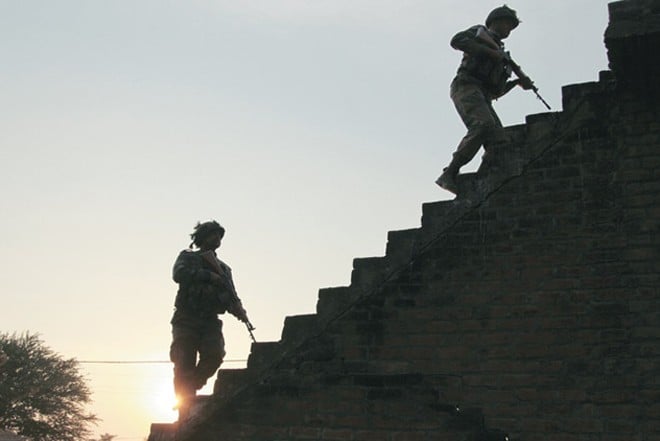
It’s not just about Pakistan and India anymore. There’s Afghanistan as well. And when seen in this new triangular light, things change…

It was a cold winter afternoon in Lahore when I walked into my neighbourhood grocery store, only to find the two shopkeepers riveted to the tv.
"What’s going on?" I inquired.
"There’s been an attack in India, in a place called Pathankot."
"Oh really," I replied, "must be our boys again."
What followed was a tirade of "how can you say that, that’s what the Indians are also saying, there’s no proof", and the like. But, what stayed with me was my own kneejerk reaction based on my historic conditioning.
A couple of days later, right in the aftermath of the attack at the Indian consulate in Mazar-e-Sharif, Afghanistan, I came across the following tweet, by a South Asian security analyst based in Washington DC: "Pakistan’s ISI isn’t happy with Prime Minister Modi’s visit to Kabul, even after Pak Army Chief visited Kabul".
I engaged the user, asking how he could bring in the ISI, to which he replied: "It reads ISI all over it". To be fair, it did. Again, historic conditioning.
But Pakistan, India is not just about the two countries anymore. There’s Afghanistan as well. And seen in this new triangular light, things change. Take, for example, the Afghan Taliban. Are they happy with the recent overtures between the Ghani and Sharif government?
"Not at all," says Sami Yousufzai, Newsweek correspondent for Pakistan and Afghanistan. "The attacks on the Indian consulate are payback for growing relations between the Ghani government and Islamabad". The relationship between Kabul and Islamabad is now back on track, thanks to pressure from both the United States and China. And this mend means that Pakistan may be looking to pressurise the Afghan Taliban back to the negotiating table.
"The Taliban understand all this," says Yousufzai, continuing, "Their sanctuaries in Pakistan, their free movement, everything is on the line".
On the flipside, there’s Pathankot. As was expected, the hyper-nationalist Indian media took no time in putting the blame squarely on Pakistan. But now that the dust has finally settled, it seems that they weren’t too off the mark. The United Jihad Council (UJC) has taken responsibility for the attack, and it is well known that its leaders operate freely in Azad Jammu and Kashmir (AJK). According to India’s Press Information Bureau, Pakistan has been provided with "specific and actionable" information on the attack.
But is everything that black and white?
Let’s go back to 2012, to an interview with Syed Salahuddin, the head of the United Jihad Council (and the Hizbul Mujahideen). Salahuddin claimed that "Kashmir has been the key issue but now it has become peripheral as all claims of supporting our struggle politically, diplomatically and morally are nothing but lip service".
Later, he warned, "We are fighting Pakistan’s war in Kashmir and if it withdraws its support, the war would be fought inside Pakistan".
Consider now, how the UJC may have felt, in the recent thawing of relations between New Delhi and Islamabad.
"There will be jihadi groups who will feel threatened by the Modi-Nawaz meeting, and they will have some supporters within the establishment as well," says Kamran Bokhari, an expert on South Asian geopolitics and author of the book Political Islam in the Age of Democratization.
"Pathankot was not only an attempt to make the Pakistani establishment look like its stuck in its anti-India past, but also to show that Islamabad does not have total control over all its proxies."
For its part, Delhi has so far refrained from officially blaming Pakistan for the incident. But as usual, the ball is clearly back in Pakistan’s court. If Islamabad does take action against the UJC and its leaders, it not only will alienate the Kashmiris and its struggle against the Indian state, but may also open the doors to blowback from jihadi outfits operating in the region.
Pakistan’s use of militants as proxies has been of a utilitarian nature, with the proxies far more attached to the cause than the patron, who is using the proxies as a means to an end. This is in sharp contrast to the Iranian model where the state and Hezbollah are not only on the same page, but also working towards the same goal. This use and discard policy has historically come at a high cost -- the best example perhaps being the rise of the Pakistani Taliban after the U-turn on Afghanistan.
How will the proxies react if the peace process with New Delhi is resumed?
"Some may be cajoled into accepting the State’s new stance, but those more loyal than the patron will have to be dealt with", says Bokhari. "It’s going to be very difficult, there may be blowback within the borders as well, but it’s doable."
All signs, both from the western and eastern fronts, point to a change in strategy from Pakistan’s point of view. However, assets from the past may look to sabotage any attempts by Islamabad to turn the page.
In the end, it’s going to be a matter of who wants what the most.